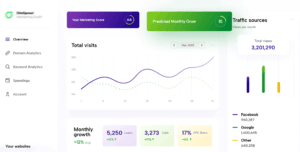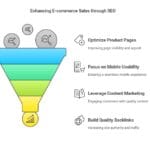
In the ever-evolving landscape of digital marketing, keywords remain at the heart of search engine optimization (SEO). While SEO strategies have advanced considerably in recent years, the importance of understanding and leveraging keywords effectively cannot be overstated. This blog will explore the role of keywords in modern SEO strategies, how they have evolved, and the best practices for optimizing them in a competitive online environment.
The Evolution of Keywords in SEO
When SEO first emerged as a critical component of online marketing, keywords were primarily about density and repetition. The more times a keyword appeared on a webpage, the better its chances of ranking. However, search engines like Google have since grown smarter. Algorithms now prioritize quality, relevance, and user intent over sheer frequency.
Some notable milestones in the evolution of keyword strategies include:
- Google’s Hummingbird Update (2013): This update introduced semantic search, focusing on understanding user intent rather than just matching exact keywords.
- RankBrain Integration (2015): Google’s machine-learning algorithm further improved its ability to interpret search queries, emphasizing contextual relevance over keyword stuffing.
- BERT Update (2019): Bidirectional Encoder Representations from Transformers (BERT) enhanced Google’s understanding of natural language, making it crucial for content creators to align keywords with conversational and intent-driven queries.
The Role of Keywords in Modern SEO
In today’s SEO landscape, keywords serve several vital functions:
- Understanding User Intent Keywords are no longer just about phrases users type into search engines; they’re insights into user behavior. Identifying high-intent keywords helps businesses understand what potential customers are looking for and create content that directly addresses their needs.
- Content Organization Keywords act as the backbone of content strategies. By clustering related keywords, businesses can plan blog posts, landing pages, and product descriptions that align with user interests.
- Driving Traffic and Conversions Targeting the right keywords can attract organic traffic to a website. When aligned with user intent, these keywords not only bring visitors but also boost conversion rates.
- Supporting Other SEO Efforts Effective keyword strategies enhance other SEO efforts, such as backlinking, internal linking, and metadata optimization. By using targeted keywords in anchor texts and descriptions, businesses can improve their overall visibility and relevance.
Types of Keywords to Consider
Modern SEO strategies emphasize a diverse range of keywords to capture various aspects of user intent and behavior:
- Short-Tail Keywords These are broad search terms consisting of one or two words, such as “SEO services.” While they attract high search volumes, they often have intense competition and lower conversion rates.
- Long-Tail Keywords Longer, more specific phrases like “affordable SEO services for small businesses” cater to niche audiences and often result in higher conversion rates.
- LSI (Latent Semantic Indexing) Keywords These are terms related to the primary keyword. For example, LSI keywords for “SEO tools” might include “keyword research software” and “SEO audit platforms.”
- Transactional Keywords Phrases indicating purchase intent, such as “buy running shoes online” or “best deals on smartphones,” are critical for e-commerce websites.
- Informational Keywords These keywords align with users seeking knowledge or solutions, like “how to optimize a website for SEO.” They are great for driving traffic to blogs and resource pages.
- Branded Keywords These include terms specific to a brand, such as “Nike shoes” or “HubSpot CRM.” Optimizing for branded keywords ensures visibility for customers already familiar with your business.
Best Practices for Keyword Optimization
To maximize the impact of keywords in modern SEO, businesses should adopt the following best practices:
- Conduct Thorough Keyword Research Use tools like Google Keyword Planner, Ahrefs, SEMrush, and Moz to identify high-value keywords. Focus on metrics such as search volume, competition level, and cost-per-click (CPC).
- Prioritize User Intent Align keywords with the intent behind search queries—whether informational, navigational, or transactional. Understanding what users want ensures your content meets their expectations.
- Optimize for Voice Search With the rise of voice assistants like Alexa and Siri, conversational and question-based keywords (e.g., “What’s the best coffee shop near me?”) are becoming increasingly important.
- Integrate Keywords Naturally Avoid keyword stuffing. Instead, weave keywords seamlessly into your content to maintain readability and engage users effectively.
- Leverage Long-Tail Keywords Long-tail keywords are less competitive and more likely to attract highly targeted traffic. Incorporate them into blog posts, FAQs, and product pages.
- Monitor Performance Regularly track keyword rankings and performance using analytics tools. Adjust your strategy based on trends and insights.
- Focus on Semantic SEO Include synonyms, related terms, and LSI keywords to create comprehensive content that satisfies both user queries and search engine algorithms.
The Future of Keywords in SEO
As technology continues to advance, the role of keywords in SEO will evolve. Emerging trends that will shape keyword strategies include:
- AI-Powered Search With AI-driven algorithms like Google’s MUM (Multitask Unified Model), understanding context and nuances in keywords will become even more critical.
- Visual and Image Search Optimization Optimizing image alt texts and using keywords in visual content metadata will play a larger role as visual search gains popularity.
- Hyper-Localized Keywords As users increasingly seek local solutions, targeting hyper-local keywords (e.g., “SEO agency in Florence, Italy”) will become essential for businesses.
- Cross-Channel Integration Keywords will need to be consistent across various platforms, including social media, video content, and e-commerce marketplaces, to ensure a unified brand presence.
Conclusion
Keywords remain a cornerstone of SEO strategies, but their role has expanded far beyond simple repetition. In the modern SEO landscape, keywords are about understanding user intent, creating valuable content, and staying adaptive to algorithm updates. By focusing on diverse keyword types, prioritizing user experience, and embracing new trends, businesses can leverage keywords to achieve sustainable growth and visibility in search engines.
The future of SEO lies in aligning keyword strategies with emerging technologies and user behaviors. By staying informed and proactive, businesses can continue to harness the power of keywords to drive organic traffic, enhance user engagement, and achieve long-term success in the digital world.





